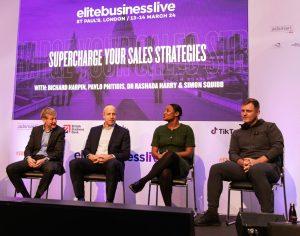How do you keep your business safe from cyber threats?
Andrew Stevens, Director of UK Small Business at Vodafone, Nicola Cook, Chief Opportunity Officer at Company Shortcuts, Luca Schnettler, Founder & CEO at Qumata Group and Ben Law, Vice President, Head of UK & Ireland at GoDaddy spoke on the first day of Elite Business on 10 March for the Digital Transformation panel, talking about the importance of data, GDPR, and how businesses can navigate in an accelerated digital world.
As a business, it’s essential to understand your target audience and the journey they take towards purchasing your product or service. How can you understand your customers buying styles better? By analysing your data, of course. Once you understand the buying journey your customers go through, you can predict their next move – and create a loyal customer base. Nicola Cook, Chief Opportunity Officer at Company Shortcuts, My viewpoint is always looking at it from a customer journey perspective… What you need to do is create a ‘buying journey’. The irony is that people hate to be sold yet love the feeling of buying. And if you’re going to understand how your customer is going to engage with your company both in terms of attracting them and then guiding them through a process so that they end up becoming a loyal customer, is you have to understand one of those data points to predict what the next stage of the journey needs to be.
How do you get your customers to share their information with consent? Luca Schnettler, Founder & CEO at Qumata Group, spoke about stricter GDPR laws and how new transparency means customers are more likely to trust companies with their data than ever before. He said: If people want to share their data there needs to be a value-added in it for them. That’s the first thing. It’s like paying for something. Facebook is a great example; you don’t pay to get access to Facebook but you do pay with your data. I think it’s always the same concept. Getting something that is a value add to the customer that allows them to pay for it… When GDPR came in, everyone was saying it was going to be bad for businesses, but on the other side of the argument, customers were not sharing their data because they feel like companies are going to misuse it and there is going to be a less amount of trust. When these stricter data regulations came in, it has helped customers build up more of a trust that if they do give their data to a GDPR compliant company, then I know that data is not going to be misused. Then people will be more willing to ‘pay’ for their data.
How important is it to build trust with your customers around their data? Andrew Stevens, Director of UK Small Business at Vodafone explained how the ‘trust’ factor is essential to have to develop a loyal customer base. People are looking for support and a long-term relationship with businesses, and the ‘salesy’ approach can be a rather outdated concept. Speaking on the panel, he said: I think the most important commodity in the market is trust, I believe that’s the most valuable commodity to trade with at the moment. The way businesses operate is shifting towards a more support-based methodology rather than a sales-based methodology. If customers see value in terms of the support they’re providing, they’re more willing to engage on a longer-term basis with you and share more with you and it becomes more of a partnership. A support-based partnership derives mutual benefit for all parties.
How do you protect your business in the digital world? Ben Law, Vice President, Head of UK & Ireland at GoDaddy spoke about several ways you can equip your websites and portals to prevent cyber-attacks, no matter the scale of your business. Speaking on the panel, Ben said: Cyber security is a risk for a business of any size, whether it’s a one-person business or several thousand pounds at enterprise level. I think we know there are risks. There are things you can do as a small business to take the steps to protect your data. The compliance regulations, you’re looking at customer data in line with the GDPR. If you’ve got good business practices in place, you can deliver that trust factor that you’re handling their data properly and you’re processing them properly. There are certain steps you can take towards protecting your data. There is password management within your organisation, and also simple functions that are often overlooked such as an SSL certificate, which will protect the transmission of data around your site. Many people offer website security tools so you can monitor for downtime, anomalies and you can protect and back your site and services running as quick as possible.
“
Share via:


















































